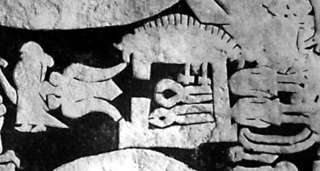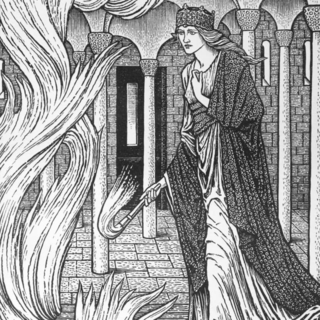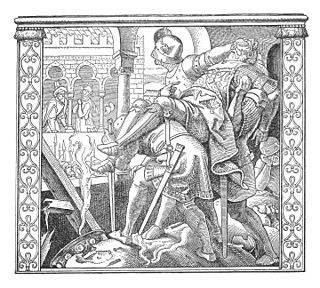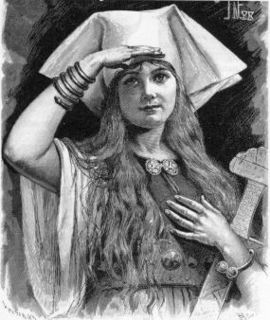 W
WAccording to the Gesta Danorum, Alfhild, daughter of the Geatish king Siward, was a shieldmaiden who had her own fleet of longships with crews of young female pirates and raided along the coasts of the Baltic Sea.
 W
WAlfhild or Alvildam was a legendary Saxon princess mentioned in Gesta Danorum. Her suitors: the king of the Danes, Skiod and the governor of the Alamanni Skat fought for her hand, the former winning. Later she gave birth to a son.
 W
WIn the Old Norse written corpus, berserkers were those who were said to have fought in a trance-like fury, a characteristic which later gave rise to the modern English word berserk. Berserkers are attested to in numerous Old Norse sources.
 W
WBess or Bessus was a legendary Danish general mentioned in Gesta Danorum. His master, Prince Gram gave his wife, Roar to him after he grew tired of her. Later Bess served as the principal general of Gram during his invasion of Sweden and led the negotiations with the future wife of Gram, Groa. After Gram married Groa, Bess urged the continuation of war, which eventually led to the death of the Swedish king.
 W
WBöðvildr, Beadohild, Bodil or Badhild was the princess of an evil king Níðuðr/Niðhad/Niðung who appears in Germanic legends, such as Deor, Völundarkviða and Þiðrekssaga. Initially, she appears to have been a tragic victim of Wayland the smith's revenge on her father, but in later Scandinavian versions, she becomes Wayland's wife and the mother of the hero Viðga of the Þiðrekssaga and medieval Scandinavian ballads.
 W
WBrunhild, also known as Brunhilda or Brynhild, is a female character from Germanic heroic legend. She may have her origins in the Visigothic princess Brunhilda of Austrasia.
 W
WTróndur í Gøtu was a Viking era chieftain from the Faroe Islands.
 W
WGudrun or Kriemhild is the wife of Sigurd/Siegfried and a major figure in Germanic heroic legend and literature. She is believed to have her origins in Ildico, last wife of Attila the Hun, and two queens of the Merovingian dynasty, Brunhilda of Austrasia and Fredegund.
 W
WThe Haddingjar refers on the one hand to Germanic heroic legends about two brothers by this name, and on the other hand to possibly related legends based on the Hasdingi, the royal dynasty of the Vandals. The accounts vary greatly.
 W
WHagen or Högni is a Burgundian warrior in Germanic heroic legend about the Burgundian kingdom at Worms. Hagen is often identified as a brother or half-brother of King Gunther. In the Nibelungenlied he is nicknamed "from Tronje".
 W
WHeime (German), Háma, or Heimir was a Germanic figure in Germanic heroic legend who often appears together with his friend Witige. He appears in the Anglo-Saxon poems Beowulf and Widsith, in the Scandinavian Þiðrekssaga and in German epics such as Alpharts Tod.
 W
WHeoroweard is a character who appears in Beowulf and also in Norse legends, where he is named Hjörvarðr or Hiartuar. If he existed in real life, his name would have been Proto-Norse *Heruwarduz.
 W
WHildebrand is a character from Germanic heroic legend. Hildebrand is the modern German form of the name: in Old High German it is Hiltibrant and in Old Norse Hildibrandr. The word hild means "battle" and brand means "sword". The name itself is very likely of Lombardic origin.
 W
WHjalmar and Ingeborg were a legendary Swedish duo. The male protagonist Hjalmar and his duel for Ingeborg figures in the Hervarar saga and in Orvar-Odd's saga, as well as in Gesta Danorum, Lay of Hyndla and a number of Faroese ballads. Hjalmar never lost a battle until meeting a berserker wielding the cursed sword Tyrfing.
 W
WHlod or Hlöd was the illegitimate son of Heidrek, the king of the Geats, in Norse mythology.
 W
WIn Scandinavian mythology, Huld is only referenced by völva or seiðkona, that is a woman who practiced the seiðr. She is mentioned in the Ynglinga saga, Sturlunga saga and a late medieval Icelandic tale. In the latter source, she is Odin's mistress and the mother of the demi-goddesses Þorgerðr and Irpa. As her name suggests, Huld may be in origin the same being as the Hulder and the German Holda.
 W
WAccording to legend, Lagertha was a Viking shield-maiden and ruler from what is now Norway, and the onetime wife of the famous Viking Ragnar Lodbrok. Her tale was recorded by the chronicler Saxo in the 12th century. According to the historian Judith Jesch, Saxo's tales about warrior women are largely fictional; other historians wrote that they may have a basis in tales about the Norse deity Thorgerd.
 W
WLyser or Liserus was an old and one-eyed rover mentioned in Gesta Danorum. He and Hading fought against Loker, the king of Curonians, only to be defeated.
 W
WRoar or Roari was a Danish woman in Gesta Danorum. She was raised together with Prince Gram and later married him. Marriage however ended when Gram grew tired of his wive and arranged her marriage to his retainer, Bess.
 W
WRüdiger von Bechelaren is a legendary hero of German mythology immortalised in the Nibelungenlied saga. Serving as the Austrian Margrave of Pöchlarn and a member of Etzel's court, he becomes conflicted after swearing oaths to uphold two factions that ultimately go to war against each other.
 W
WSigrid the Haughty, also known as Sigríð Storråda, is a queen appearing in Norse sagas as wife, first of Eric the Victorious of Sweden, then Sweyn Forkbeard of Denmark. Sigrid appears in many sagas composed generations after the events they describe, but there is no reliable evidence as to her existence as they describe her. The figure of Sigrid appears mainly in late Icelandic sagas, while more contemporary sources such as Thietmar of Merseburg and Adam of Bremen instead claim that Sweyn was married to a Polish princess, identified as Świętosława. Snorri Sturluson gives conflicting information and in one place says that Sweyn was married to Sigrid and in another that he was married to a Gunhild of Wenden.
 W
WSvanhild is the beautiful daughter of Sigurd and Gudrun in Germanic heroic legend, whose grisly death at the hands of her jealous royal husband Ermanaric was told in many northern European stories, including the Old Norse Poetic Edda, Prose Edda, and Völsunga Saga; the skaldic poem Ragnarsdrápa; the Danish Latin Gesta Danorum; and the German Latin Annals of Quedlinburg.
 W
WThora Borgarhjört, is a mythical character in the Norse sagas – the wife of Ragnar Loðbrók, who kills a serpent to win her hand in marriage. Thora was the daughter of Herrauðr, the Earl of Götaland.
 W
WViking is the name of the son of Vífil and Eimyrja in Þorsteins saga Víkingssonar. Viking is the father of Thorsten and Thorer. Further details of his legend are recounted in Frithiof's Saga.
 W
WIn Germanic mythology, Wayland the Smith is a master blacksmith originating in Germanic heroic legend, described by Jessie Weston as "the weird and malicious craftsman, Weyland".